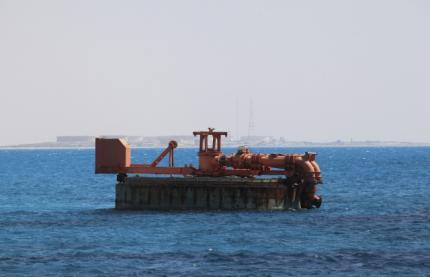Brent above $ 108 on supply woes, may post second weekly los
Bareksa • 09 May 2014

A general view of pipelines is seen at the Zueitina oil terminal in Zueitina (REUTERS/Esam Omran Al-Fetori)
There are two factors supporting oil - supply-side risks and expectations of steady gasoline demand
Bareksa.com - Brent crude held steady above $108 per barrel on Friday, supported by renewed tension in Ukraine and continued limited supply from Libya, but was on track for a second weekly loss.
Pro-Moscow separatists in eastern Ukraine ignored a public call by Russian President Vladimir Putin to postpone a referendum on self-rule, declaring they would go ahead on Sunday with a vote that could lead to war. Investors are worried that any spread of the conflict could disrupt supply from world's top oil producer Russia.
Brent crude for June delivery gained 39 cents to $108.43 per barrel at 0635 GMT, after closing 9 cents lower on Thursday. U.S. oil was up 41 cents at $100.67. The contract, which settled 51 cents lower on Thursday, was on course for its first weekly gain in three, boosted by a surprise drop in U.S. crude inventories last week.
"There are two factors supporting oil - supply-side risks and expectations of steady gasoline demand from the United States as the summer driving season gets underway," said Tetsu Emori, a commodity fund manager at Astmax Investment. "It is quite difficult to go short on oil at this point."
Emori expects U.S. crude to be supported at around $100 a barrel and any dips below that providing a buying opportunity. The upper end of the range is about $102-$103 in the short term, with the benchmark touching $105 towards the end of June, on the back of strong U.S. gasoline demand.
Brent will remain about $7-$8 more expensive that the U.S. contract, and the gap may widen to as much as $10 by end-June, driven primarily by supply concerns, he said.
Leading to a further worsening of relations between Russia and the West, European Union governments have laid the groundwork for possible sanctions against Russian companies, including energy giants, over Ukraine.
"Heightened tensions remain, especially after a series of violent clashes," analysts at Phillip Futures said in a note. "Uncertainties continue to peg crude oil prices at elevated levels on concerns over possible disruptions."
Libyan ports
A Libyan government deal to reopen major oil ports controlled by rebels looks likely to unravel as the appointment of a new Islamist-backed prime minister has fuelled distrust that is eroding support for the accord.
Still, Libya's government said it remains committed to implementing an agreement with the rebels occupying the eastern ports of Ras Lanuf and Es Sider and hopes the export terminals will reopen soon.
Oil investors were also watching the outcome of talks between Iran and world powers in ending Tehran's disputed nuclear programme, with the slow, steady progress helping cap gains in oil prices.
Iran and six world powers held more "useful" talks on Tehran's nuclear programme, both sides said, although a Western diplomat said they were still struggling to overcome deep disagreements on the future of Iranian atomic capabilities.
The two days of expert-level talks in New York were a prelude to next week's political-level negotiations in the Austrian capital Vienna.
"Geopolitical risks seem to be overshadowing seasonally softer demand in Brent with a plethora of factors enduring in key supply markets," ANZ analysts said in a note.
"The Ukraine and Libya remain as upside risks, while the looming resolution of Iranian discussions with the West is the main downside risk."
Brent may retrace to a support at $107.54 again, as indicated by its wave pattern, while signals are mixed for U.S. oil, according to Reuters technical analyst Wang Tao.
(Source : Reuters)